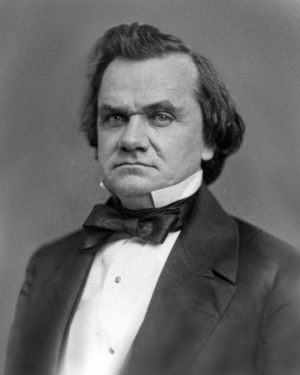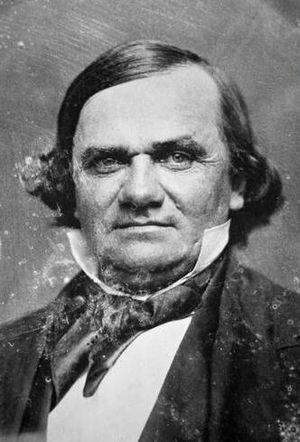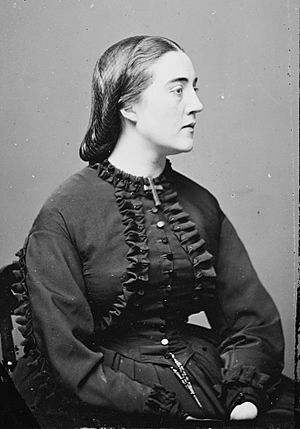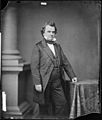Stephen A. Douglas facts for kids
Quick facts for kids
Stephen A. Douglas
|
|
|---|---|

Portrait by Julian Vannerson
|
|
| United States Senator from Illinois |
|
| In office March 4, 1847 – June 3, 1861 |
|
| Preceded by | James Semple |
| Succeeded by | Orville H. Browning |
| Member of the U.S. House of Representatives from Illinois's 5th district |
|
| In office March 4, 1843 – March 3, 1847 |
|
| Preceded by | Constituency established |
| Succeeded by | William Richardson |
| Associate Justice of the Supreme Court of Illinois | |
| In office February 15, 1841 – June 28, 1843 |
|
| Preceded by | Seat established |
| Succeeded by | James Shields |
| 7th Secretary of State of Illinois | |
| In office November 30, 1840 – February 15, 1841 |
|
| Governor | Thomas Carlin |
| Preceded by | Alexander P. Field |
| Succeeded by | Lyman Trumbull |
| Personal details | |
| Born |
Stephen Arnold Douglass
April 23, 1813 Brandon, Vermont, U.S. |
| Died | June 3, 1861 (aged 48) Chicago, Illinois, U.S. |
| Resting place | Stephen A. Douglas Tomb, Chicago |
| Political party | Democratic |
| Spouses |
|
| Children | 4 |
| Signature | |
Stephen Arnold Douglas (born April 23, 1813 – died June 3, 1861) was an important American politician and lawyer from Illinois. He was a major figure in the Democratic Party before the American Civil War. Douglas ran for president in the 1860 election but lost to Abraham Lincoln.
Douglas was known as the "Little Giant." This nickname came from his short height, but also from his strong and powerful presence in politics.
Contents
Early Life and Education
Stephen Arnold Douglas was born in Brandon, Vermont, on April 23, 1813. His father, a doctor, died when Stephen was only two months old. Stephen, his mother, and older sister moved to a farm.
Stephen went to school in Brandon. He then decided to study at Brandon Academy to prepare for a professional career. When he was 17, his family moved to New York. He continued his education at Canandaigua Academy. There, he studied Latin and Greek and became very good at debating. He may have already been thinking about a career in politics.
In 1833, at just 20 years old, Douglas decided to move west to find his fortune. He went to Jacksonville, Illinois, which was a growing town. In Illinois, it was easier to become a lawyer. He became friends with a lawyer named Murray McConnel. Douglas was allowed to practice law in Illinois in March 1834.
Political Career
Douglas quickly became successful in politics as a member of the new Democratic Party. He served in the Illinois House of Representatives and other roles. In 1843, he was elected to the United States House of Representatives. He supported President James K. Polk and favored adding Texas to the U.S. and the Mexican–American War.
In 1847, the Illinois legislature elected Douglas to the United States Senate. He became a national leader for his party in the 1850s. Douglas tried to become president in 1852 but lost the nomination to Franklin Pierce.
Kansas-Nebraska Act
To help open up the western lands for settlement, Douglas introduced the Kansas–Nebraska Act in 1854. This law allowed people in new territories to decide for themselves if they wanted slavery. This idea was called "popular sovereignty." Douglas hoped this law would reduce tensions between the North and South. However, it caused a strong negative reaction in the North. It also helped the anti-slavery Republican Party grow stronger.
Douglas tried for president again in 1856. But the Democratic Party chose James Buchanan, who won the election.
Lincoln-Douglas Debates
In 1858, Douglas had a series of famous debates with Abraham Lincoln. These were known as the Lincoln–Douglas debates. During these debates, Douglas explained his "Freeport Doctrine." This idea said that even if the Supreme Court ruled that slavery could exist in territories (as in the 1857 Dred Scott v. Sandford case), people in a territory could still stop slavery by not passing laws to protect it.
In the 1860 presidential election, Lincoln and Douglas were the main candidates in the North. Most Southerners supported other candidates. Lincoln's strong support in the North led him to win the election.
Civil War and Support for Lincoln
After the Confederate attack on Fort Sumter in April 1861, Lincoln declared a state of rebellion. He asked for 75,000 soldiers to stop it. Douglas met with Lincoln privately. He looked over Lincoln's plan before it was announced and fully supported it. Douglas even suggested that Lincoln ask for 200,000 soldiers instead of 75,000. He told a friend, "He'll come out all right, and we will all stand by him."
Death
Douglas became ill in May 1861. He had typhoid fever and other health problems. He died on June 3, 1861. This was the same day as the Battle of Philippi, which was one of the first fights of the American Civil War.
Marriage and Family
In March 1847, Stephen Douglas married Martha Martin. She was 21 years old and from a wealthy family in North Carolina. After their marriage, Martha inherited a large cotton plantation with many enslaved people in Mississippi. Douglas was named the manager of this property. However, as a senator from the free state of Illinois, and hoping to become president, owning a Southern plantation caused problems for him. He hired someone else to manage the plantation. He used his share of the money to help his political career.
Stephen and Martha moved their home to Chicago, Illinois, in 1847. They had two sons: Robert M. Douglas (1849–1917) and Stephen Arnold Douglas, Jr. (1850–1908). Martha Douglas died in January 1853, after giving birth to a daughter. The baby also died a few weeks later.
On November 20, 1856, Douglas married for a second time to 20-year-old Adele Cutts. She was from Washington, D.C. Adele was a Catholic. With Stephen's agreement, she had his two sons baptized as Catholic and raised them in that faith. Adele had a miscarriage in 1858. The next year, she gave birth to a daughter, Rachel, who lived only a few weeks.
Position on Slavery
Historians have discussed Stephen Douglas's views on slavery for a long time. In his "Freeport Doctrine" of 1858, he said that he did not care if slavery was voted up or down. He believed that white people in the territories should have the right to decide for themselves.
He disagreed with the Supreme Court's Dred Scott decision. That ruling said that Congress could not control slavery in the territories. Douglas also fought against President Buchanan's support for the Lecompton Constitution. This constitution would have made Kansas a slave state. Douglas's fight against it helped him get the Democratic nomination for president in 1860, but it also divided his party.
Legacy
Old University of Chicago
Douglas gave land for a group of Baptists to build the Old University of Chicago.
Memorials
Douglas's burial site was bought by the state of Illinois. A large monument with a statue was built over his grave. His birthplace in Brandon, Vermont, is now a museum. Many places are named after him, including several counties across the U.S. and cities like Douglas and Douglas, Wyoming.
In 1869, a large park in Chicago was named Douglas Park in his honor. In 2020, the park was renamed Douglass Park, after the abolitionists Frederick Douglass and Anna Murray Douglass.
Images for kids
-
Stephen A. Douglas, photograph by Mathew Brady
-
Statue of Douglas at the site of the 1858 debate in Freeport, Illinois
See also
 In Spanish: Stephen A. Douglas para niños
In Spanish: Stephen A. Douglas para niños
 | Misty Copeland |
 | Raven Wilkinson |
 | Debra Austin |
 | Aesha Ash |








